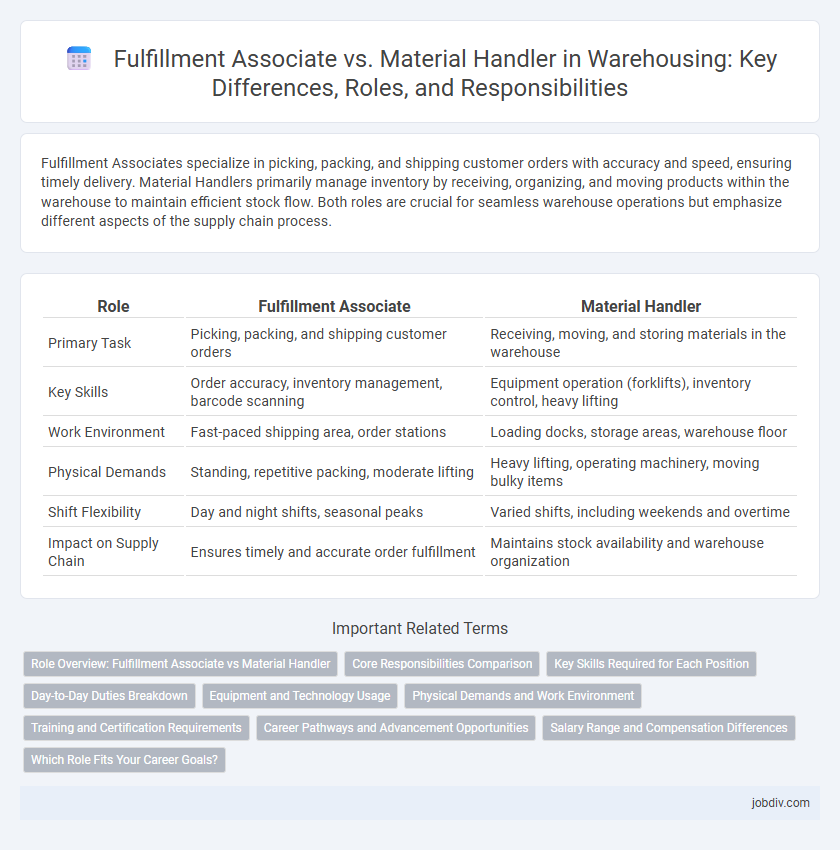Fulfillment Associates specialize in picking, packing, and shipping customer orders with accuracy and speed, ensuring timely delivery. Material Handlers primarily manage inventory by receiving, organizing, and moving products within the warehouse to maintain efficient stock flow. Both roles are crucial for seamless warehouse operations but emphasize different aspects of the supply chain process.
Table of Comparison
| Role | Fulfillment Associate | Material Handler |
|---|---|---|
| Primary Task | Picking, packing, and shipping customer orders | Receiving, moving, and storing materials in the warehouse |
| Key Skills | Order accuracy, inventory management, barcode scanning | Equipment operation (forklifts), inventory control, heavy lifting |
| Work Environment | Fast-paced shipping area, order stations | Loading docks, storage areas, warehouse floor |
| Physical Demands | Standing, repetitive packing, moderate lifting | Heavy lifting, operating machinery, moving bulky items |
| Shift Flexibility | Day and night shifts, seasonal peaks | Varied shifts, including weekends and overtime |
| Impact on Supply Chain | Ensures timely and accurate order fulfillment | Maintains stock availability and warehouse organization |
Role Overview: Fulfillment Associate vs Material Handler
Fulfillment Associates specialize in processing customer orders by picking, packing, and preparing shipments with accuracy to ensure timely delivery and customer satisfaction. Material Handlers focus on receiving, storing, and moving inventory within the warehouse, utilizing equipment like forklifts and pallet jacks to maintain efficient stock management. Both roles require attention to detail and adherence to safety protocols but differ primarily in direct customer order fulfillment versus internal inventory operations.
Core Responsibilities Comparison
Fulfillment Associates focus on order picking, packing, and ensuring accurate shipment of products, while Material Handlers primarily manage the receipt, storage, and movement of inventory within the warehouse. Fulfillment Associates often use scanning technology to verify orders and maintain inventory accuracy, whereas Material Handlers operate forklifts and organize stock to optimize space utilization. Both roles are essential for efficient warehouse operations but differ in their emphasis on order processing versus inventory handling.
Key Skills Required for Each Position
Fulfillment Associates require strong order processing abilities, attention to detail, and proficiency in inventory management systems to ensure accurate picking, packing, and shipping of products. Material Handlers need physical stamina, experience with forklift operation, and skills in organizing and moving inventory efficiently within the warehouse environment. Both roles demand teamwork, time management, and adherence to safety protocols but differ in technical skills and operational focus.
Day-to-Day Duties Breakdown
Fulfillment Associates primarily focus on order processing, picking, packing, and ensuring accurate shipment preparation, while Material Handlers handle inventory movement, loading and unloading goods, and organizing stock within the warehouse. Fulfillment Associates use barcode scanners and inventory management systems to verify order accuracy, whereas Material Handlers operate forklifts and pallet jacks for efficient material transport. These distinct roles combine to optimize warehouse operations by balancing precise order fulfillment with effective inventory control and material flow.
Equipment and Technology Usage
Fulfillment Associates primarily utilize barcode scanners, conveyor belts, and automated packing systems to expedite order processing and ensure accuracy. Material Handlers often operate forklifts, pallet jacks, and inventory management software to move, organize, and track stock within the warehouse. Both roles leverage warehouse management systems (WMS) but apply technology differently based on task specialization and equipment handling requirements.
Physical Demands and Work Environment
Fulfillment Associates typically engage in repetitive picking, packing, and sorting requiring agility, standing for extended periods in climate-controlled warehouse settings. Material Handlers perform heavier lifting, loading, and unloading tasks often in variable warehouse temperatures and may operate machinery, exposing them to more physically strenuous conditions. Both roles demand stamina and adherence to safety protocols, but Material Handlers face higher physical exertion and exposure to environmental hazards.
Training and Certification Requirements
Fulfillment Associates typically require training in order picking, packing techniques, and basic inventory software, often provided on the job with few formal certifications needed. Material Handlers usually undergo more extensive training on warehouse equipment operation, safety protocols, and may obtain certifications such as OSHA forklift or hazardous materials handling to ensure compliance and safe material movement. Both roles emphasize practical skills, but Material Handlers demand formal certifications related to equipment handling and workplace safety standards.
Career Pathways and Advancement Opportunities
Fulfillment Associates typically focus on order processing, picking, packing, and shipping tasks, offering foundational experience for entry-level positions in warehousing. Material Handlers handle inventory management, equipment operation, and stock replenishment, which can lead to specialized roles such as forklift operator or inventory control supervisor. Career advancement for Fulfillment Associates usually progresses toward supervisory or logistics coordinator roles, while Material Handlers have clear pathways into warehouse management or supply chain analyst positions.
Salary Range and Compensation Differences
Fulfillment Associates typically earn between $28,000 and $40,000 annually, with compensation often including bonuses tied to order accuracy and speed, while Material Handlers' salaries range from $25,000 to $38,000, reflecting their focus on inventory movement and equipment operation. Fulfillment Associates may receive higher performance incentives due to their direct role in processing and packaging customer orders. Material Handlers usually benefit from overtime pay and shift differentials that can impact total compensation.
Which Role Fits Your Career Goals?
A Fulfillment Associate excels in order processing, inventory management, and customer satisfaction, making it ideal for careers aiming toward logistics coordination and operational efficiency. A Material Handler specializes in the movement, storage, and handling of goods, suited for roles focused on supply chain operations and physical inventory control. Assessing your career goals toward either detailed order fulfillment or broader warehouse logistics will help determine the best fit between these roles.
Fulfillment Associate vs Material Handler Infographic

 jobdiv.com
jobdiv.com